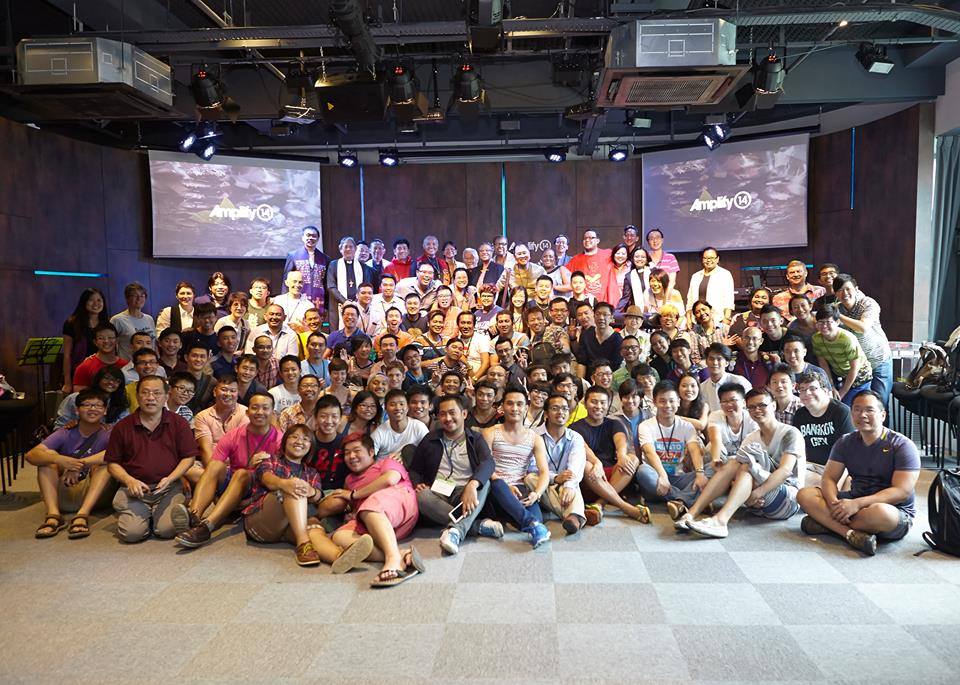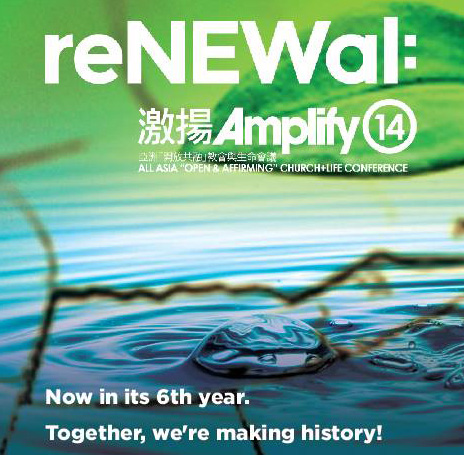
Participants of the 2014 Amplify Conference of LGBTIQ open churches in Asia.
My reflection draws on a workshop entitled “Erotic Renewals: Rethinking Sex as LGBTQ Christians” that I designed and delivered at the recent Amplify 2014 Conference. This All-Asia Open and Affirming Church + Life Conference that gathers diverse lesbian, gay, bisexual, trans*, intersex and queer persons, as well as straight-identifying allies, was hosted by Free Community Church, Singapore between September 12 and 14, 2014. Approximately 200 clergy and non-clergy delegates from Australia, China (both mainland and Hong Kong), Indonesia, Japan, Malaysia, the Philippines, Singapore, South Korea, Taiwan and the USA gathered to share personal stories and learn more about intersecting issues of gender, sexuality and the Christian faith. Amplify aims to forge relationships and collaborations between open and affirming churches and ministries around the region of South, Southeast and East Asia, and Australia. It has been held previously in Singapore, Malaysia and Hong Kong. This year, Amplify adopted the theme “ReNEWal.”
The “Erotic Renewals” workshop was held in the afternoon of Saturday, September 13, 2014 and drew approximately 70 participants from various countries. It aimed at providing an avenue for continuing conversations on the spiritual/theological dimensions of sexuality and sex for LGBTQ Christians living in Asia. As a theology in everyday life workshop, it aspired to assist participants in deep reflections and frank conversations on how sexuality and sex can be a means to connect with God, and how God can reside in sexual encounters. The workshop sought to help participants identify the spiritual dimensions of the sexual act, to rethink notions of sexual guilt and shame, and to map healthy directions for their own sexual lives by focusing on their own lived experiences and circumstances.
After a brief introduction on gender, sexuality and sex, I proceeded to discuss the impact of Augustine’s and Aquinas’ theologies of sex on contemporary theological discourses that are homophobic and transphobic in nature. A significant amount of time was given for participants to gather in small groups and share their stories of sex and sexuality. Group leaders were identified, and tasked with summarising and presenting the group discussions. The questions that guided the discussions dealt with positive and negative experiences of sex in life and as Christians, and how sexuality and sex can lead one towards or away from God. The various groups presented on how “good sex” comes by way of bondings, other-awareness, love, vulnerability, connection, mutual respect and experiences of orgasm, whether in committed relationships or casual sexual encounters. Conversely, they mentioned that “bad sex” was engendered through manipulations, deceit, trivialisation, violence and exploitation. “Bad sex” was also encountered in experiences of shame, sexual incompatibility, racism, eroticisation and addiction.
The participants acknowledged that sex was a difficult language to speak, and that sexual theologies were even harder to learn. Many spoke of the experiences of sexual guilt and silence that were fostered by their previous non-affirming churches, as well as Christian friends who did not understand them. They agreed that sexuality and sex drove a wedge between them and God when it was enmeshed in feelings of shame, unworthiness and consequent feelings of alienation from non-affirming churches. Nevertheless, sex and sexuality served as bridges to God through committed monogamous relationships, deep intimacy and vulnerability, self-acceptance and honesty.
After this group activity, I delivered a short presentation that showcased excerpts of queer, sexual theologies from the works of Jakob Hero, Carter Heyward, Robert E. Shore-Goss and Rose Wu. A brief, open discussion was held thereafter. To conclude, I invited each participant to participate in a Sexuality Project. The Project consisted of a personal plan to work on an issue of sex and/or sexuality within six months, and to consider the role of God in such a Project.
During the group presentations, a workshop participant offered the thought that when sexual persons engage in healthy, truly vulnerable and intimate relations, they become “like God” and reflect God’s image. Such forms of sexual relations mirror the purest form of God’s love for all human persons. This participant concluded that sexual orientation allows the queer Christian to experience God in different ways, for instance, by becoming more open-minded about life issues, including sexuality and sex. During this time, I was instantly reminded of the various notions of godding—the word “God” that is used as a verb—from feminist theologians who see intimate collaborations between God and human persons. I first thought of lesbian, feminist theologian and priest Carter Heyward’s affirmation that “we god in love, no one of us is alone, and that in the relation between subject and subject, there is power.”[1] It occurred to me that when sexual persons pursue right relationships with each other—regardless of their sexual desires, gender expression, or gender identifyings—a power that is God in God’s utter dynamism overflows in their lives. Through their embodied actions, sexual persons enflesh and manifest God.
Sexuality and sex are gateways through which a God who is already visible in this world becomes even more visible. If we hold God as the originator and bestower of all that is good and wholesome in human existence, then we must concede that vestiges of God can be found in human persons who are created in the image and likeness of this God. If we believe that God is present in all human persons because Christ came to reveal the face of God and became “God’s love with skin on it”[2] for all to see and feel, then we must accept that all aspects of human life, including sexuality and sex are possible conduits of God’s love, grace and power for others, as well as for oneself. Feminist theologian Virginia Ramey Mollenkott reminds us that “human responsibility, in its deepest and fullest dimension, entails godding, an embodiment or incarnation of God’s love in human flesh, with the goal of cocreating with God a just and loving human society.”[3] Sexuality and sex can become the implements through which human, sexual persons engage in co-creative activity with God to render God and God’s love more visible in personal and communitarian ways. Sexual engagements that are just, egalitarian, mutually respectful, consensual, loving, and which do no harm to self or others offer possibilities for connecting with and deeply revealing God, who is embedded in the life of each single human person.
___
Joseph N. Goh is currently pursuing a Ph.D. in Gender, Sexuality and Theology with the School of Arts and Social Sciences at Monash University, Malaysia. He holds a Licentiate in Sacred Theology (S.T.L.) from the Jesuit School of Theology of Santa Clara University in Berkeley, CA. An ordained minister with the North American Catholic Ecumenical Church (NACEC), Goh is also a member of the Emerging Queer Asian Pacific Islander Religion Scholars (EQARS) and the editor of the Queer Asian Spirit E-Magazine (QAS E-Zine).
Copyright © 2014 Joseph N. Goh. All Rights Reserved.
[1] Carter Heyward, The Redemption of God: A Theology of Mutual Relation (Washington, D.C: University Press of America, 1982), 153.
[2] Darlene Garner, “On Letting Go: An Interpretation of Judges 12:1-6” (Sermon presented at the Amplify 2014 All-Asia Open and Affirming Church + Life Conference, Free Community Church, Singapore, September 14, 2014).
[3] Virginia R. Mollenkott, Godding: Human Responsibility and the Bible (New York, NY: Crossroad, 1987), 2. Emphasis in the original.


